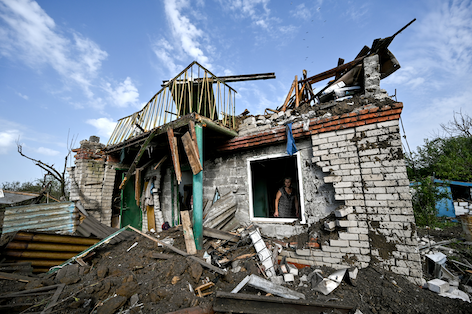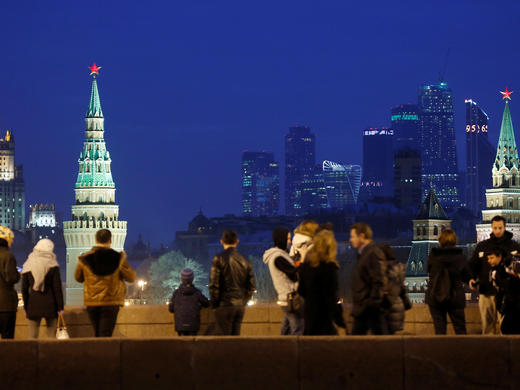Not much is known for certain about the Wagner Group. Since the decentralized private network of Russian mercenaries first appeared in aid of Russia’s 2014 annexation of Crimea, the Kremlin has always denied it exists. Meanwhile, the US government and its allies view the paramilitary outfit as a proxy force for Russia’s Ministry of Defence, allegedly funded by Yevgeny Prigozhin, a Russian oligarch and one of President Vladimir Putin’s most trusted loyalists. However, some analysts argue that conceptualizing the Wagner Group as a coherent entity is misguided — giving an unwarranted level of autonomy to something that doesn’t appear on paper and has no established structure or leadership.
Nevertheless, the group has been playing its most visible role yet during the ongoing war in Ukraine. Its fighters are participating in front-line battles and engaging in a public relations blitz and recruitment drive in Russia. In mid-August, Ukrainian forces claimed to have bombed a Wagner Group headquarters in the Luhansk region after a photo posted on Telegram by a pro-Russia journalist accidentally revealed its location.
But long before the Wagner Group re-entered the limelight in Ukraine, soldiers of fortune operating under its amorphous brand have popped up in conflict zones and volatile nations all around the world. Acting in line with Russian state interests, these mercenaries have guarded infrastructure and natural resource sites, trained domestic security forces, protected elites, conducted counter-insurgency operations and supported rogue military leaders in places as diverse as Syria, Venezuela and at least a dozen African countries.
The group’s material impact is now being somewhat overshadowed by its function as a propaganda tool allowing Russia to gain a strategic foothold in fragile, resource-rich nations on the periphery of Western attention. Evidence for this activity has grown recently. New disinformation campaigns celebrating the Wagner Group based on myth-making efforts around its deployments have been appearing online months before Wagner boots hit the ground in countries where Russia is seeking to supplant Western influence.
In this way the Wagner Group’s evolution is unique. However, its rising public profile also shines light on the growing demand for private military companies (PMCs) in modern conflicts — increasingly messy, drawn-out and ill-defined affairs.
Deniable Influence: The Wagner Group’s Evolving Usefulness
The Wagner Group’s recent emergence in West Africa is showing similarities to its continuing involvement in the Central African Republic (CAR). One difference is that deceptive campaigns on Facebook — alongside broader pro-Russia influence operations — have been used as a tool to garner public support ahead of time for newly established military junta regimes in the restive Sahel region to hire the mercenaries as replacements for Western counterterrorism forces.
According to analysis by experts at the Atlantic Council’s Digital Forensics Research Lab, in February 2020 a handful of Facebook pages in Mali began promoting narratives that lobbied for Wagner mercenaries to be deployed to the country, well before they actually arrived in late 2021.
“Content shared by the network is aimed at undermining French interests, promoting Russia as a viable alternative to the West, and mobilizing public support for the government of interim President Assimi Goïta and the Malian military,” say the researchers.
As of February 2022, the network had amassed 140,000 total followers on pages trying to pass themselves off as non-profit organizations and community groups. This figure likely underestimates the network’s reach — as Nigerian development expert Idayat Hassan has pointed out, social media in Africa functions as an evolved form of “pavement radio,” with community members often congregating around a single device to consume content together.
Of the roughly 24,000 pieces of content produced, one-third of it was replicated across multiple pages and posted within seconds of each other. Aside from advocating for the Wagner Group, the posts also argued for maintaining military rule and postponing elections required to transition back to democratic governance.
Parallel analysis by the Digital Forensics Research Lab and investigative consortium Code for Africa illustrates how events in Mali were then leveraged by pro-Russia actors in neighbouring Burkina Faso ahead of that country’s January 2022 coup. Over a four-month span beginning in mid-September 2021 — as it was becoming clear that the Wagner Group was likely to be deployed to Mali — Facebook content in Burkina Faso mentioning the Wagner Group jumped 1,900 percent compared to the entire two preceding years.
By the time a Burkinabe military contingent stripped President Roch Kaboré of power on January 24, the Wagner Group was mentioned in 1,250 posts that received around 350,000 user engagements — a remarkable contrast to the 70 posts mentioning the mercenaries between September 2019 and September 2021. The posts often featured photos claiming to be from Wagner Group operations in Mali but were actually repurposed images of Russian military convoys in Syria from years earlier. Others included staged photos of camouflaged men holding airsoft guns (realistic-looking replicas).
US intelligence officials told Foreign Policy at the end of July they suspect the Wagner Group will be deployed to Burkina Faso next. If so, it would mark their latest foray into a destabilized country where Russian interests intersect with a population caught up in an intensifying political struggle or security crisis.
After the Wagner Group first formed in eastern Ukraine in 2014, non-enlisted Russian soldiers began routinely appearing in Syria by 2015. They were soon integrated into Russian efforts to prop up the embattled regime of Syrian President Bashar al-Assad, at times clashing with American special forces present in eastern Syria as part of the international coalition battling the Islamic State.
By early 2019, thousands of mercenaries linked to the Wagner Group could be found supporting military advances of rebel commander Khalifa Haftar across Libya. Hundreds of others landed in Caracas to ensure the safety of Venezuelan President Nicolás Maduro amid a swelling anti-government movement that followed opposition leader Juan Guaidó’s declaring himself president.
Yet, during this formative period in the Wagner Group’s development, the most overt efforts to burnish its reputation were taking place far away in the CAR.
In August 2017, President Faustin-Archange Touadéra — whose government then controlled barely a third of the impoverished former French colony after years of brutal sectarian civil war — signed an agreement with the Russian government for Moscow to provide military support in exchange for access to the CAR’s large deposits of diamonds, gold, uranium and other minerals. Observers have argued this security deal created the opening for the Wagner Group’s involvement by 2018, operating under the guise of military trainers and advisers.
With the support of Russian mercenaries, Touadéra’s administration has since achieved a tenuous peace for civilians in government-controlled areas. This includes repelling an attempt by ex-president François Bozizé, ousted in 2013, to rally a splintering insurgency to storm the capital, Bangui, in January 2021, one month after Touadéra was re-elected.
Pro-Wagner actors have thus tried to characterize the mercenaries as saviours. In November 2021, a statue celebrating Russian soldiers was erected in central Bangui. A feature-length film glorifying the Wagner Group’s involvement in the CAR has also been screened to audiences up to 10,000 strong, packed into soccer stadiums — all of it allegedly funded by Yevgeny Prigozhin.
However, a spokesperson for President Touadéra recently denied the Wagner Group was even present in the CAR — this, despite numerous reports from UN experts accusing Wagner Group personnel of conducting arbitrary detentions, enforced disappearances and summary executions in the country. Investigations by media outlets and human rights organizations also claim the mercenaries are responsible for the murder of Russian journalists looking into the Russian activity in the CAR and the lethal plundering of artisanal gold mines on the border with Sudan, among other atrocities.
This reflects how deniability eclipses military acumen and unchecked ruthlessness as the Wagner Group’s most desirable trait — equally serving Russia’s interests and those of host regimes. The mercenaries have proven to be an effective means to achieve any number of ends without ever having to acknowledge the truth about their role, or fallout from their presence.
Outsourcing the use of violence in chaotic locations presents a serious challenge to core tenets of state security and established international law.
Rising Demand for Mercenaries Reflects Changing Nature of Conflict
From a legal perspective, a PMC is a corporate entity; a mercenary group is not. On the ground, though, the difference between the two can be almost impossible to discern. And the use of both is undoubtedly on the rise.
The demand for PMCs has skyrocketed since Russia’s invasion of Ukraine, with their services reportedly sought in Ukraine to assist with evacuations, logistics and protection of humanitarian organizations. In April, just two months into the war, European officials claimed Russia had already deployed up to 20,000 Syrian and Libyan mercenaries in the Donbas region, offering Syrian government soldiers up to 50 times their monthly salary to enlist.
Elsewhere, the Saudi-led coalition fighting Iran-aligned Houthi rebels in Yemen was formerly recruiting hired guns from the remnants of Colombia’s largest rebel force, the Revolutionary Armed Forces of Colombia (FARC), and fighters from African tribal militias — some of them children. Chinese companies working in the heart of Africa have begun to hire private security firms to protect their mining operations after residents have vandalized worksites and harassed Chinese employees over unfair working conditions and profits being siphoned away from local communities. French, British, German and Israeli PMCs are active throughout the continent as well. During the US occupation of Iraq, the footprint of PMCs ranged from 100,000 to 160,000 personnel at their height, nearly equal to the size of the official American military force they were supporting.
Outsourcing the use of violence to PMCs in chaotic locations presents a serious challenge to core tenets of state security and established international law. And indeed, the risks of human rights abuses and war crimes stemming from PMC involvements is all too apparent.
Part of this is derived from how PMCs are granted some level of impunity based on how they typically operate in multinational contexts and exist outside of traditional military and criminal justice structures. They also have a financial interest in the continuation of instability, which brings in more business opportunities. At the same time, the main international treaty meant to govern the use of PMCs remains unsigned and unratified by the five permanent members of the UN Security Council — China, France, Russia, the United Kingdom and the United States — since it entered into force in October 2001.
And yet, reducing demand for PMCs in weak states where militaries lack the strength, resources and professionalism to ensure a nation’s security would require continual foreign training, hardware and financial assistance — and vigilant oversight. It would also require addressing complex development, climate and governance issues that give rise to conflicts in the first place — at a time when wealthy countries with the means and expertise to do so are turning more inward or becoming consumed by the return of great-power rivalries. Meanwhile, UN peacekeeping missions are failing those they are meant to protect as insurgencies drag on without resolution in situations where foreign benefactors are opting for what one expert describes as “light footprint warfare.”
These dynamics mean the labour market for mercenaries is booming. Erstwhile rebels or former members of state security forces can easily find lucrative opportunities in an increasingly unstable world. Recruitment via social media and private messaging groups is also making that process both simpler and more opaque all the time. A 2020 report from Aerospace & Defense News estimated that the global private military and security industry was then worth around US$224 billion, with projections to reach US$457 billion by 2030. For comparison, China — with the world’s second-largest military budget behind the United States — spent an estimated US$293 billion on its military in 2021.
In a recent interview, Marat Gabidullin, the first former member of the Wagner Group to go on record about his experience, argued that “mercenary groups are nothing to be ashamed of, they exist everywhere, but we lie about them.”
Going forward, Gabidullin’s Wagner Group colleagues still in the game appear poised to profit — as does the Kremlin, politically — from those services being lied about, and promoted, in online campaigns targeting citizens desperate for security, in some of the world’s most dangerous and forgotten places.



